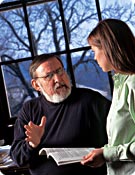“What is justice?” James Lennertz, associate professor of government and law, asks rhetorically in his office in Kirby Hall of Civil Rights. “Does it change from culture to culture and from generation to generation? Or are there values that transcend cultures and historical eras?”
Lennertz was two weeks into teaching his course on Comparative Law and Justice Sept. 11. “When I arrived for class that morning, the students were already watching CNN’s coverage of unfolding events,” he said. Later, turning off the television, he asked the students if their study of justice could help them understand what had happened and what they thought should happen next. “Does justice demand swift and decisive retribution?” Lennertz asked his class. “Every student had a response. It was probably the best-sustained discussion in my career here. These kids were chewing on difficult questions in a thoughtful, intelligent way. It was a bittersweet moment on a tragic day. But it was also one of those satisfying, triumphant moments that makes it good to be a teacher here.”
Lennertz works hard to bring interesting experiences to his students. He collaborated with attorney Scot A. Duvall ’87 on a moot court project for a first-year course on political humor. The project was based on the Larry Flynt vs. Jerry Falwell case in which Flynt successfully claimed an article in his magazine was a satirical parody and protected by the First Amendment. The Lafayette case focused upon free expression and satire within the context of protest art on a mythical college campus. Duvall, who specializes in intellectual property law with Middleton Reutlinger in Louisville, Ky., lectured to the students via videoconferencing, came to campus for a long weekend to work with the students, and advised them via email on their briefs.
“Prof. Lennertz has been a thoughtful and caring mentor during my time at Lafayette and in the fifteen years since,” say Duvall. “Jim has a unique approach to teaching that helps students feel invested in the search for answers. He employs humor, popular culture, and current events to great effect. The most valuable insight he gave me was that ‘there are no perfect answers, but some answers are better than others.’ So, when he offered me the chance to participate in his political humor symposium, I was thrilled. Working with Jim again, and with Lafayette students, was a very enriching experience.”
Lennertz recalls several other former students during his career. “I have satisfying memories of students I’ve gotten to know who have gone on to do fabulous things,” says Lennertz, who oversees the department’s internship program. “I’m proud of what they’ve accomplished and feel that I was somehow able to touch them and enable them to facilitate their achievements.” One student was Patrick Fletcher ’82, with whom Lennertz had no contact for 20 years. “He’s now superintendent of schools in Glen Rock, N.J. and last fall sent me a note saying I was one of the people who had an impact on who he’d become. Those are the kinds of comments and moments that make teaching more a rewarding vocation than a mere job.”
Over the years Lennertz also developed dozens of legal and political simulations, including a mock trial of alleged acquaintance rape on a college campus, a simulation of the development and filming of presidential campaign TV ads, and a moot court considering the constitutionality of military tribunals to try suspected terrorists.
After 27 years of teaching law, is he ever bored? “Just when you think you have a good handle on a particular issue in the law, nine folks in D.C. (the Supreme Court) issue a new ruling and it’s back to the drawing board,” he says.
Highlights
Publications:“Back in Their Proper Place: Racial Gerrymandering in Georgia,” Political Geography, vol. 19, Feb. 2000, 163-188; Theodore Lowi, Benjamin Ginsburg, Steven Jackson, and Lennertz, Analyzing American Government, 4th edition, W.W. Norton & Co., New York, 1995; “The ‘Wall of Separation’: Friend or Foe of Religious Influence?” “The American Jury,” “Tocqueville’s Observations: Method, Madness, or Both?” in Stephen Frantzich, ed., Tocqueville in the Classroom: An Educator’s Resource, C-SPAN, Washington, D.C., April 1997; “Law and Justice in Comparative Perspective: Simulating the Appeal of Ocalan vs. Turkey to the European Court of Human Rights,” World Association for Case Method Research & Application conference, July, 2000.
Honors: Lindback Distinguished Teaching Award, 1988; Student Government Award for Superior Teaching, 1976; Daniel F. Golden, Class of 1934, Faculty Service Award, 2001.
Achievements: Member, Massachusetts Bar; Fulbright-Hays Award to University of Grenoble, France, 1981.
Contact: (610) 330-5391, lennertj@lafayette.edu

James Lennertz (left), associate professor of government and law, works with Sarah Stocker ’03 on her legal arguments for an environmental law moot court.
